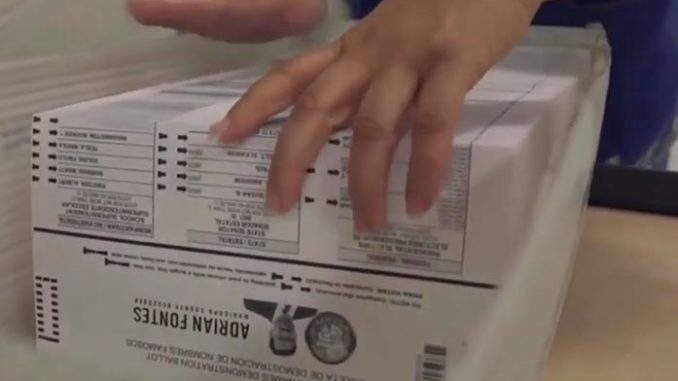
Arizona Secretary of State Katie Hobbs continues to argue that members of the Navajo Nation should not be granted extra time for their mailed in ballots to arrive at the county recorder’s office, even though her attorney admitted Tuesday that residents on the reservation suffer from limited and sometimes “unreliable” mail service.
The Ninth Circuit of the U.S. Court of Appeals in San Francisco held oral arguments on Oct. 13 in a federal lawsuit filed in August by several members of the Navajo Nation who contend Arizona’s deadline for receipt of postmarked mailed-in ballots violates the federal Voting Rights Act.
The deadline requires 2020 general election ballots to be postmarked on or before Nov. 3. Those ballots must also be received by the appropriate county recorder’s office by 7 p.m. Nov. 3.
According to the lawsuit known as Yazzie v. Hobbs, the reservation encompasses more than 27,000 square miles but has only 24 post offices. Very few residents receive home postal delivery, which requires most to drive long distances -sometimes 100 miles roundtrip- to receive or drop off their mail.
U.S. District Judge G. Murray Snow ruled Sept. 25 that while the Navajo plaintiffs sufficiently documented issues with their mail service they still “have access to several voting options” and thus were not entitled to a 10-day extension past Nov. 3 for considering their mailed-in ballots received on time.
The plaintiffs then took their case to the federal court of appeals.
Hobbs, who is the state’s top elections official, has put in much effort this year to promote early voting and ballot drop-off locations on the reservation, including a special election guide for Native American voters. However, Hobbs’ attorney told the three-judge appellate panel that the secretary opposes any extension of the well-publicized and longstanding Nov. 3 deadline.
There is also a concern, the secretary contends, that a separate deadline applicable only to members of the Navajo Nation would lead to “voter confusion and significant administrative burden” for the state’s 15 elected county recorders.
But during his arguments Tuesday, Steven Sandven, the attorney for the six plaintiffs argued his clients’ limited access to U.S. Postal Services facilities and timely delivery violates their rights to equal participation in state elections. He pointed to a study which showed Scottsdale voter can wait longer -as much as 10 days- to mail in a ballot and still be assured it arrives by the Nov. 3 deadline.
Sandven also argued that the lack of postal services is compounded by the scarcity of election-day voting centers. While Scottsdale has one election-day polling location every 13 square miles, the ration on the reservation is one election-day polling site for every 300 square miles.
That unfairly restricts members of the Navajo Nation, Sandven argued.
All three appellate judges noted one of the dilemmas is what redress the court can order given there are non-tribal members who live on the Navajo Nation and suffer the same mail delays.
The judges also allowed the non-partisan League of Women Voters time to address an amicus curiae (friend of the court) brief filed in support of relief for voters living on the Navajo Nation.
The lawsuit initially drew attention from the reelection campaign of President Donald Trump, which sought to intervene in the case along with other Republican Party organizations. Snow denied the intervenors, none of whom attempted to file pleadings in the appeal.
A decision is expected later this week after which any of the parties could file an emergency petition to the U.S. Supreme Court.
Earlier this month the supreme court justices agreed to review a federal court of appeals ruling concerning Arizona’s ballot-harvesting law. No decision will be made in that case until next year, meaning restrictions will remain in place for the Nov. 3 general election on who can turn in another voter’s ballot.
Prior to 2016, various civic organizations and political parties in Arizona would actively gather -or harvest- ballots and then deliver them to a polling site. But a state law enacted in 2016 allows only a voter’s family, other household members, and caregivers to deliver such ballots.
Most other third-parties are prohibited from harvesting someone else’s ballot. Violating the law can lead to a Class 6 felony charge, which is punishable by up to a one-year prison term and a fine of up to $150,000.
